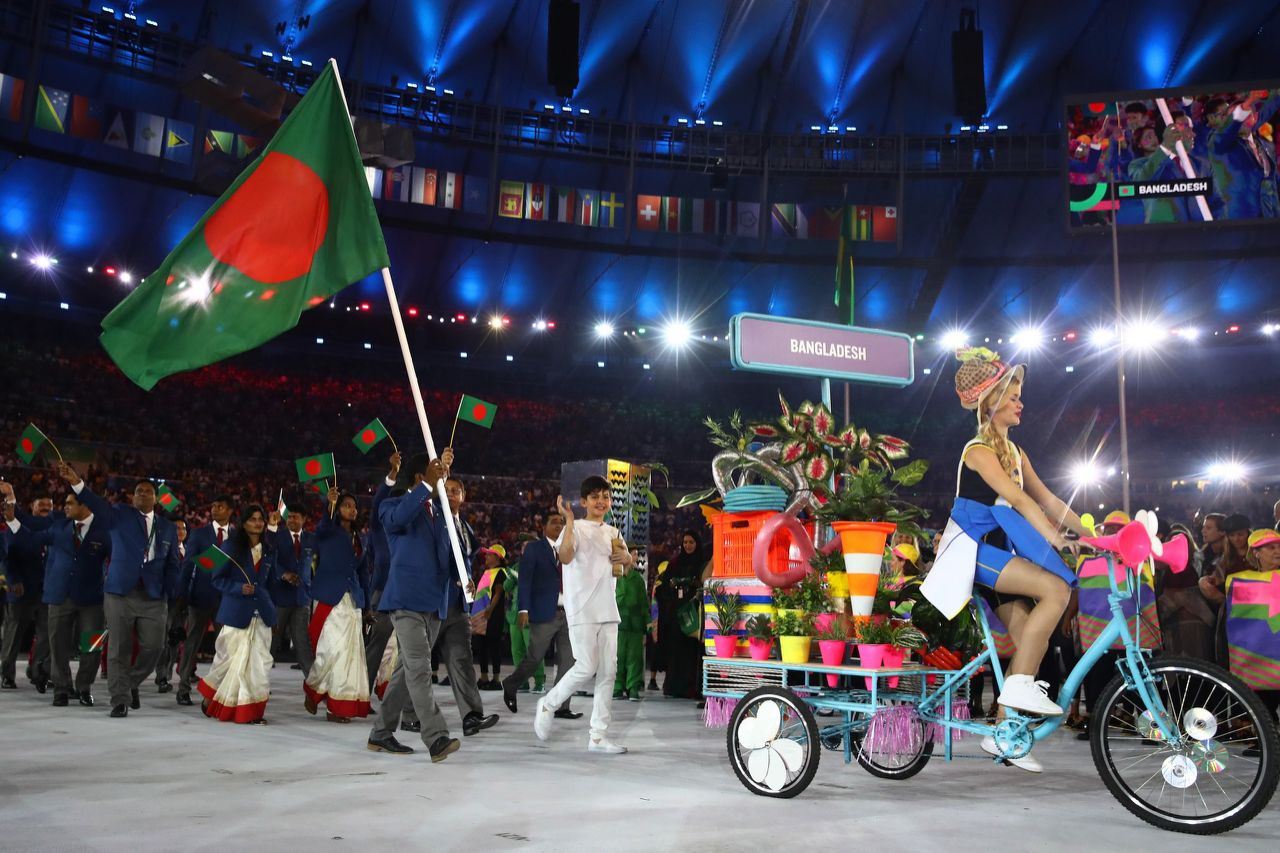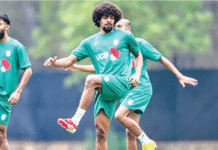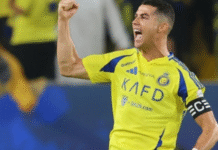Why the world’s eighth most populous country never has won an Olympic medal
Saidur Rahman Dawn knew he had little chance of advancing out of the preliminary heats in the 100 and 200 meters when he was selected to be his country’s first Olympian in 1984.
The dearth of proper training, facilities and equipment in Bangladesh hindered Dawn’s preparation and development. The 21-year-old didn’t own a pair of track spikes until he was 16, didn’t receive any coaching until he was 17 and didn’t first run on a synthetic track until he was 19.
Before Dawn enrolled in college and began working with a coach for the first time, he trained exclusively on a grass field near his childhood home. He measured out 100 or 200 meters by hand, laced up his sneakers and then asked a friend to manually time how long it took him to sprint to the makeshift finish line.
“Nobody taught me how to run,” Dawn said. “Nobody taught me how to get into my stride. Nobody taught me how to do weight training or endurance or flexibility or all those things. Basically, I studied how other people ran. I tried to read books about different athletes and what they were doing or what they were eating, but it was difficult.”
Dawn clocked the slowest time in his 100-meter heat and the second slowest in his 200-meter heat at the 1984 Olympics, yet he returned to Bangladesh beaming with pride. By marching in the Opening Ceremony and running in two races, Dawn hoped he made reaching the Olympics an attainable goal for Bangladeshi children and paved the way for the country to become more successful in years to come.
“I thought the government would provide more funding, a lot of kids would be motivated and it would be a great starting point for Bangladesh in sports,” Dawn said.
In retrospect, he could not have been more wrong.
Thirty-two years after Bangladesh’s Olympic debut, the world’s eighth most populous country still has not won a single medal, nor has it even managed to produce a viable contender. No Bangladeshi athlete has competed at the Winter Games, and none of the country’s 43 summer Olympians have placed better than 21st in an event.
While population rankings typically are a poor barometer for Olympic success, Bangladesh’s futility is still unfathomable for a country with an estimated 160 million residents. Of the world’s 40 most populous countries, the only others without an Olympic medal are war-ravaged Democratic Republic of Congo (No. 18) and Myanmar (No. 26), which until recently had been governed by an oppressive military dictatorship.
Seven athletes from Bangladesh competed in Rio the past two weeks with only modest success to show for it.

Neither of Bangladesh’s sprinters came close to advancing out of the first round of prelims as Masbah Ahmmed clocked 11.34 seconds in the men’s 100 meters on Saturday and Shirin Akter ran a time of 12.99 seconds in the women’s 100 the previous day. Swimmers Mohammad Mahfizur Rahman and Sonia Aktar both set personal bests in the men’s and women’s 50-meter freestyle last week, but they finished a distant 54th and 69th overall, respectively. Shamoli Ray lost 6-0 in the opening round of the women’s archery competition, and Abdullah Hel Baki placed 25th out of 50 in men’s 10-meter air rifle qualifying.
The Bangladeshi athlete who can claim the most meaningful achievement is a golfer who grew up in one of the capital city’s teeming slum neighborhoods and got his start in the sport gathering stray balls for pocket change.
Siddikur Rahman’s second-place finish at the Mauritius Open in May helped him become the first athlete from his country to qualify for the Olympics on merit. Athletes from Bangladesh have previously only made it via the wildcard system, which grants places to countries that have not met qualifying criteria and otherwise wouldn’t be involved in the Olympics.
“I think this is the biggest achievement of my life,” said Rahman, the 324th-ranked golfer in the world. “I never thought I would make it to the Olympics, but after the Mauritius Open, everyone came up to me and said, ‘You might go to the Olympics.’ Then, I became serious and determined to make it happen.”
Why the world’s eighth most populous country never has won an Olympic medal
Before the men’s golf competition began, Rahman was asked if winning his country’s first medal was a realistic goal.
“I’ll give 100 percent to win a gold medal, and I don’t think it’s impossible,” he said.
Alas, on Sunday he finished second-to-last, 27 strokes behind winner Justin Rose.
Cricket matches in Bangladesh attract massive crowd, and elite players are among the country’s leading celebrities. Children in Bangladesh grow up dreaming of playing in the country’s domestic league or for its national team the same way American kids hope to make the NFL or NBA.
Skyrocketing interest in cricket in Bangladesh has attracted a flurry of corporate sponsors. The Bangladeshi government has also heavily invested in the sport, organizing youth programs, erecting state-of-the-art facilities and paying for top coaches in hopes of helping the country’s national teams continue their recent ascent.
“All their resources are being put into cricket,” said Syque Caesar, an American-born gymnast who competed for Bangladesh at the 2012 London Olympics. “Way back when, it used to be soccer, but now that’s not as prominent in the sporting world over there. Cricket has taken over everything. When they have a little bit of success in that sport, they put more money into it.”
Whereas a talented young Bangladeshi cricket player can hope to someday achieve fame and fortune playing domestically or abroad, there’s far less incentive for the country’s top athletes to dedicate themselves to other sports. Deep-pocketed corporate sponsors are not investing as much in soccer or field hockey. Making a living is even tougher in other Olympic sports that lack a domestic league or the resources required for athletes to be competitive internationally.
“Swimming, soccer, volleyball, track, they are not getting any sponsorships anymore or money from the government,” said Ariful Haque, a nine-time Bangladeshi national champion in javelin. “That’s why athletes aren’t interested in those sports anymore. It’s a poor country and a lot of families’ income is so low. Nobody can afford to spend their own money to have their kids do sports.”
The few kids who do go into sports besides cricket or soccer often develop slowly because youth programs and training centers remain rare. The caliber of instruction can be hit or miss even when they’re older because Bangladesh can’t always afford to hire experienced, internationally renowned national team coaches.
Runners, swimmers and other Bangladeshi Olympic hopefuls typically report to national team camp one to three months before the start of a major international competition. For the rest of the year, they’re frequently left to fend for themselves, which is not ideal in a country where year-round training can be difficult or costly without facilities and equipment taken for granted elsewhere.
When Haque competed for Bangladesh in the 1980s and early ’90s, not having year-round access to a proper javelin runway and sector was the least of his issues. Of far greater concern was the fact that the government would only provide him a regulation javelin during national team camps and he lacked the money to buy one on his own.
For roughly nine months every year, Haque practiced with a bamboo javelin with a metal tip. He says he was nearly 30 years old by the time he saved enough money to buy one that met international standards.
“It made it very difficult for me,” Haque said. “When I’d switch from the bamboo to the one used at international meets, the difference was night and day.”
For example, the 16-person contingent Bangladesh sent to Rio apparently did not include the coaches of its swimmers or runners. The country instead reportedly sent two high-ranking federation officials in their place.
Caesar said that’s not the first time Bangladesh has catered to its administrators at the expense of its athletes. When Caesar competed for Bangladesh in London four years ago, he was shocked the country’s traveling party included fewer athletes than federation officials.
“You’re supposed to be showcasing the athletes at the Olympics,” Caesar said. “They’re the ones that worked their whole lives to get there. We had five athletes for Bangladesh in 2012, and we had at least 20 delegates. I didn’t ask what they all were doing, but something was a little fishy.”
Stories like that are discouraging for Bangladesh’s first Olympian. Saidur Rahman Dawn admits he thought his country would have progressed much further in the 32 years since he proudly ran at the Los Angeles Olympics.
Funding is more difficult to obtain now than it was when Dawn competed. Year-round training from top coaches remains rare. Sprinters still typically don’t have access to a running track when they’re away from national team camp, just like shooters lack an international-standard range and swimmers don’t often get to practice in an Olympic-sized pool.
The 100-meter time Dawn ran in 1984 is faster than what Bangladesh’s reigning national champion clocked Saturday in Rio. It’s difficult for Bangladeshi sprinters to accurately gauge whether they’re improving or not since, in the absence of a proper electronic device, hand timing is still common at the country’s biggest meets.
“Looking back, it makes me sad about the lack of progress,” Dawn said. “I thought we would be fighting for medals by now, but it really didn’t happen. Not only did it not happen, it went backward. There’s no funding. There’s no system in place to help athletes flourish. It’s really disappointing.”
Source: Yahoo Sports











